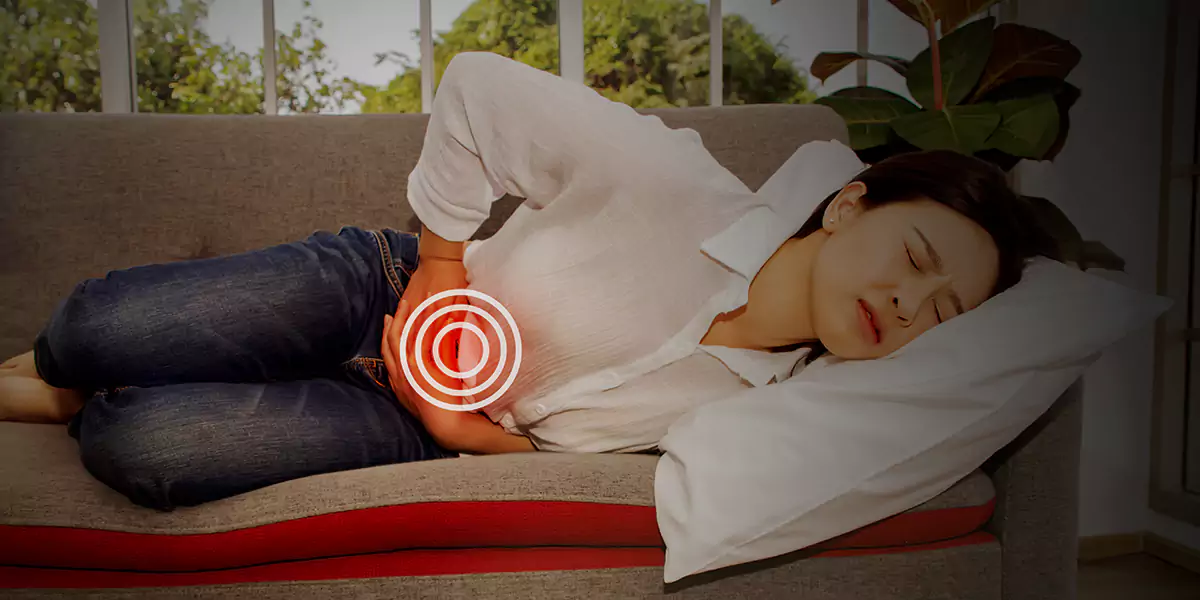All about Abdominal Migraine

What is Abdominal Migraine?
Whenever we hear the word migraine, we instantly associate it with a headache but abdominal migraine does not create a headache rather it creates pain in your abdominal area, especially the belly. The pain can be mild to severe as it can happen for a period of one hour to seventy-two hours. Though it affects people of any age, it’s rare and children are more prone to it. The average period of this problem is seventeen hours and if the pain is severe it can interfere with your day-to-day activities. According to the researchers, there is a connection between migraine and abdominal migraine as both of them have the same trigger points, treatment, and relieving factors.
What are the Types of Abdominal Migraine?
There are no different types of abdominal migraine but there are various types of migraines such as :
- Chronic migraine
- Migraine without aura
- Migraine with aura
- Migraine with brainstem aura
- Acephalgic/silent migraine
- Migraine with brainstem aura
- Abdominal migraine
- Retinal migraine
- Hemiplegic migraine
What are the Symptoms of Abdominal Migraine?

One of the major signs and symptoms of abdominal migraine is pain in the abdominal area (belly) which mainly hurts in the middle of your child’s belly or the adjacent areas of the belly button. Other than that some other symptoms of abdominal migraine include:
- The child’s appearance will become pale or flushed
- Vomiting
- Mostly feeling tired
- Being drowsy and yawning unusually
- Nausea
- Loss of appetite
- A few times a child can have headaches also
- Dark circles beneath the eyes
What Causes Abdominal Migraine?
The exact reason why abdominal migraine occurs is not yet founded by the researchers but there are a few hypotheses they believe might cause abdominal migraine including:
- Children with excessively sensitive nervous systems, particularly in the central spinal neurons’ primary sensory and in this system may be one of the causes of this disorder.
- The levels of two compounds your body produces, histamine and serotonin, and when they change, may cause abdominal migraine
- Some foods are also linked with abdominal migraine such as chocolate, food having MSG (monosodium glutamate) (MSG), and processed meats.
- Some particular causes can be genetic, psychosocial, and environmental factors
What are the Risk Factors of Abdominal Migraine?

Some risk factors which can trigger abdominal migraine are:
- Stress
- Difficulty in sleeping along with irregular sleeping problem
- Not eating for a long time such as fasting
- Being dehydrated.
- Motion and travel sickness.
- Exercise.
- Foods with high- amine like chocolates, citrus fruits, cheese chocolate, ham, and salami
- Flashing lights.
- Having high doses of caffeine.
- Family History
What are the Complications of Abdominal Migraine?
Along with the sudden pain in the belly there are a few complications of abdominal migraine among children such as:
- Long absence from school
- Stress
- Disrupting normal tasks
- Stroke may occur if the supply of blood to brain is blocked
- Anxiety
- Depression
- Panic Disorder
How Abdominal Migraine is Diagnosed?
Abdominal migraine is not easy to diagnose mainly because of two reasons, the first being there is no lab test available to diagnose this particular disease and the second being a child may not be able to tell clearly about his symptoms. A doctor has to rely on the symptoms a child is feeling by asking the child and his family members along with going through the medical history of the child. But the symptoms of abdominal migraine can be the same as some symptoms of other diseases such as stomach ulcers, crohn’s disease, irritable bowel syndrome and problems with kidney and bladder. To rule out these diseases, tests such as an abdominal ultrasound or X-ray, to dismiss other disorders.
There are some criterias that can diagnose abdominal migraine.
- If your child had at the minimum five attacks of abdominal pain in the last 72 can be a sign of abdominal migraine.
- Constant pain near the belly button that might be of mild to severe intensity
- Symptoms such as eating less, vomiting, appetite loss,and pale skin
- No proof of kidney disease or GI condition
What are the Treatment Options Available for Abdominal Migraine?
At present no cure is there for abdominal migraine but preventing episodes are available. There are also options to treat episodes of abdominal migraine when it starts.
Preventing Abdominal Migraine
Managing stress: There are a few skills that can help in managing stress such as psychotherapy also known as cognitive behavioral therapy that can be helpful to manage the stress
Tips while travelling: It’s vital to avert motion sickness while traveling, including restricting long vehicle trips with regular stops while avoiding going to places with high altitudes.
Quality sleep: Having quality sleep is important for children with abdominal migraine. A regular routine of going to bed with good sleep hygiene may be helpful to avert disturbances while sleeping
Avoiding visual triggers: Flashing and sparkling might trigger episodes, so it’s better to evade them as much as possible.
Medications To Stop Episodes of Abdominal Migraine
Some medicines prescribed by doctors to prevent episodes of abdominal migraine are
- Cyproheptadine
- Ibuprofen
- Rizatriptan.
- Pizotifen.
- Zolmitriptan
- Propranolol.
- Flunarizine.
Along with these medications which can be taken by mouth some nasal sprays such as Onzetra Xsail Nasal Powder. Imitrex Nasal Spray Tosymra Nasal Spray,Zomig Nasal Spray and Tosymra Nasal Spray may be prescribed by the doctors.
Living with Abdominal Migraine
Abdominal migraine can be very stressful and can have adverse effects on your child’s academic and normal life. As parents it’s quite important to believe in your child and give confidence to them to deal with the situation. for their health. Though it can’t be cured with proper preventive measures and treatments to stop episodes of this condition, your children can lead a normal life.
Whom to Consult
If you feel any signs or symptoms of abdominal migraine in your child, discuss with your child’s doctor about them, and share if there is any family history, especially of migraine. After checking your child, if it turns out to be abdominal migraine then the preventive measures and treatment should be started instantly.




